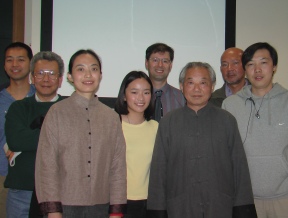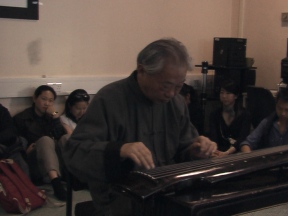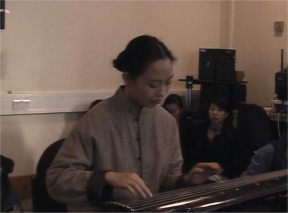 Meihua San Nong 梅花三弄
(Three Variations on the Plum Blosom), played by Lin
Youren.
Meihua San Nong 梅花三弄
(Three Variations on the Plum Blosom), played by Lin
Youren.Originally a flute piece from the Jin Dynasty, this piece describes the noble and unsullied nature of plum blossom while conveying its characteristic resistance to cold temperatures and icy winds.
This piece first appeared as a song with qin accompaniment (qin’ge) in 1592, under the title “Buddhist Chant” (Shi Tan Zhang). The words were a Chinese transliteration of a Sanskrit text. The music is serene and meditative, based on a simple pentatonic theme and maintaining a fairly steady tempo throughout.
The recreation of this piece of Tang dynasty tablature has become a popular pastime with qin players since the 1950s. It is closely associated with Confucius, whose ideas of ethics and virtue as an ideal of government were rejected. One day he saw an orchid growing alone among ordinary plants. He likened it to a wise man whose ideas are not in tune with the time, and who consequently associates with the common people.
One of the most popular qin pieces, this has been collected in over 70 qin music manuscripts in different versions. It depicts wild geese resting on a sandy beach in the cool of late autumn during their southward migration. According to legend, geese were messengers used to carry letters, and are symbolic of feelings of loneliness and separation. The music conveys a sense of nostalgia, and of the closeness between human beings, wildlife and nature.
One of the most virtuosic pieces in the qin repertoire. The impression of water is conveyed through swirling arpeggios, rippling harmonics and glissandos, yet in Lin’s hands technique remains subordinate to imagery.


